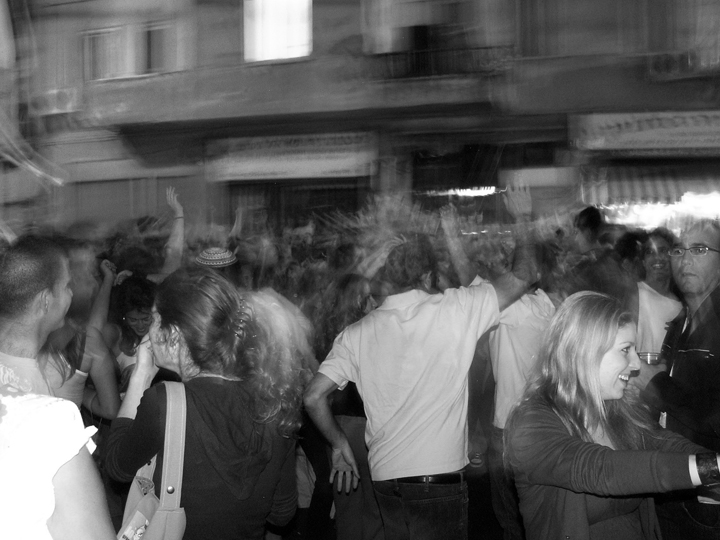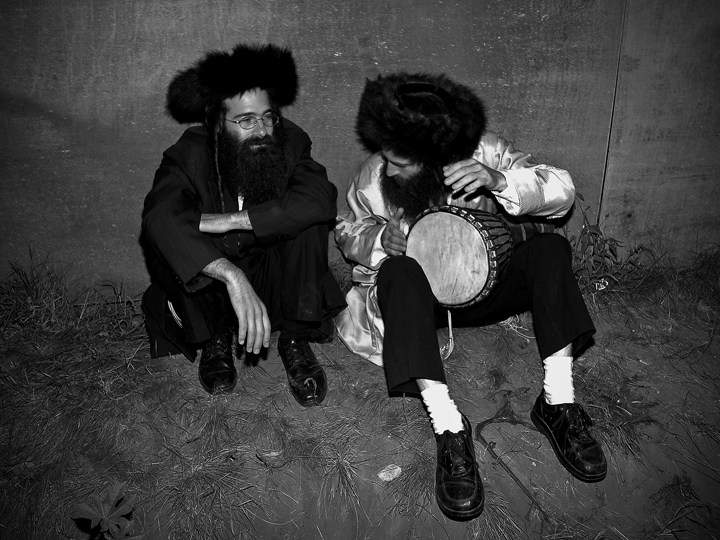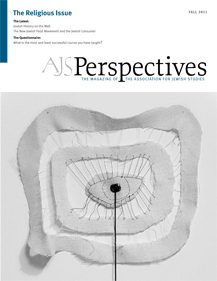

From another perspective, Leo Strauss, a secular social scientist, insists that Judaism "cannot be understood as a culture." One "cannot live on" secular Jewish culture. Playing with the biblical verse ("man cannot live on bread alone" [Deut. 8:3]), Strauss equates— with intentional irony?—secular Jewish culture to physical food; it might be necessary for survival but it remains insufficient for living a good life. Strauss turns, if not to religion in the full sense of the word (alas, there is too much of Machiavelli in Strauss), then at least to metaphysics, the transcendent, to "ideas." Always something in excess of what is imagined to be secular. Hence the irony I find in a humanistic rabbi (a term I can fathom) who recently wrote, without irony, in a letter to the editor of the Jewish Review of Books about how secular Jews celebrate Passover. Far be it from me to tell people how to celebrate this holiday, but it is known that the Haggadah went out of its way to exclude Moses in order to focus on God's direct and starring role in redeeming the Israelites through various miracles, and the holiday centers around this miraculous divine national liberation! Yes, yes, Passover has also become all about family, eating; meanings are reshaped. But if secular Judaism has communal rituals like this, is it truly secular? Indeed, editing the book Religions of America (1975), Leo Rosten included secular humanism, amusingly. A spokesperson for the New York Society for Ethical Culture notes that by law, "leaders and counselors in Ethical Culture and humanist groups are legally qualified to function as ministers of religion." This gets to the heart of the question of religion and secular, which is (as always) also a political one, a question of making lines, allocating resources, declaring and performing loyalties.

How different, after all, is the Posen Foundation's bestowing of grants for courses on cultural Judaism from former bank holding company CEO John Allison's BB&T Charitable Foundation's granting schools up to $2 million in funding if they create a course on capitalism that requires the reading of Ayn Rand's Atlas Shrugged? The degree of acceptance the Posen Foundation has gained is easily explained by the dire monetary situation in universities today, even more than the ostensible harmony of its mission with academia's secularist stance. Like so many religions, the Posen Foundation's secularism insists on ultimate values, which, in the final analysis, remain unprovable (nation, peoplehood, relativism, the irrelevance of God, a particular past, a radiant and improved future), hence the foundation deploys a system of belief (even if without supernaturalism), and grounds itself on hidden metaphysics. Its fervor and missionizing also bespeak a conversionary orientation. Obviously, many organizations act in this way, but the point is that this makes them more akin to religious groups than less, the point is that the question of God or not-God is often beside the point. Less I be misunderstood, I must note that I am a great supporter of Jewish pluralism, am all in favor of multiple forms of Judaisms—atheism, separation of church and state, modernity, critical scholarship and even secularization. May secular Jewishness thrive and be well and live long.
I cite Kaplan, Strauss, Posen, and secular Judaism not to bash the latter, nor to rehash a sterile either/or between secularism and religion, but precisely to argue for their structural codependence. Religious-secular interweaving carries salient analytical ramifications, obviously. From a diachronic, rather than structural perspective, it seems obvious that the religious and the secular generate one another. The Enlightenment reacted against religion yet was itself very much a movement within religious communities. The excesses and failures of Enlightenment programs and high modernism led to new interest in religious modalities, including postmodernism. One could point to endless macro and micro give and take between the religious and secular over the centuries. How many sons and daughters of rabbis became ardent Zionists? How many children of secularist leftists became ba'alei teshuva? The relationship of Zionism and religion on the whole has fluctuated greatly. Though the numbers leaving and coming to Jewish religiosity may not be equal, keeping in mind the bidirectionality helps prevent modernist assumptions of linearity. Claude Levi-Strauss, son of a secular family, became one of the most sensitive interpreters of tribal mythologies and a mythologer of sorts himself; secular but Zionist Hans Jonas, in whom there is so much current interest, sought to combat modernity's worst inclinations by developing a countermanding metaphysics-based ethics (one that echoes the classical rabbis surprisingly often). We all know hundreds more similar and different examples.
Synchronically, the most interesting phenomena comprise precisely those that are "in between" or comingle religion and secularism. I think of the recent rise of Israeli "tribal" youth culture—a medley of subcultures that spans Rainbow Festivals, world music, Eastern healing and spiritual paths, enjoyment of altered states of consciousness—and American Jewish environmentalism, the latter including movements to expand the laws of kashrut to cover questions of eco-kashrut (food produced through unjust labor practices or factory farming, energy wastage at synagogues, etc.). Though coming in varying shades, both Israeli youth tribalism and American eco-Judaism reject a narrow formal religion based on ancient circularly defined theology as well as vapid materialist secularism; and both combine hippie sensibilities, New Age spirituality, and some form of progressive politics (though also nationalist, even settler types). Though showing wide variety, both preach forms of secular salvation through/in nature, critiques of society's moral failures, the cleansing of sins of materialism and commercialism (a kind of saving of souls). Both evince elements of spreading the faith, insist on a personal piety and purity, and emphasize ceremonies/ rituals ranging from the purely social (hiking, retreats) to the unabashedly spiritual (farming as spiritual practice, farming within a halakhic framework). One could ask similarly about most of the prominent and interesting phenomena of Judaism/Jewishness: Are they secular or religious? And if so, how, in what ways, to what ends? I won't bother to go into more examples but it is easy to fill the answer, even for now, with phenomena and entities such as the Holocaust, the State of Israel, American Jewish education, or recent American Jewish literature.
The same comingling easily can be seen in individuals, and long before "modernity" arose. By now sociology and anthropology have made it clear that personal identity is complex, multivalent, even fragmented. Bertha Pappenheim, an ardently radical feminist and political activist who also wrote her own prayers, insisted that the League of German Jewish Women maintain kashrut, and never abandoned her Orthodox Judaism. Such complexity strikes me as fairly ubiquitous or at least frequent enough to warrant attention. Most Jews today—from all denominations, even the observant—imbibe and give some degree of credence to secular scholarship in some form, whether archaeology, historicist biblical criticism, linguistics, philosophy, psychology, sociology, natural or physical sciences, etc. Many (most? all?) religious Jews live and thrive in the modern, secular world. Many attendees at even Orthodox synagogues likely do not fully believe in God or believe in a traditional manner. Most Jews, I suspect, meld traditional Jewish mythologies about the creation of the world or of humanity, for instance, with astrophysics and evolution. Many secular Jews attend synagogue on occasion and have bar or bat mitzvahs for their children, but more importantly feel particular connection to Jewishness and Jews. Both observant and secular Jews may bifurcate their psyches, compartmentalize discursive domains or deny their own inner complexity, but I would argue that most live both secularly and religiously, if one can put it so.
Jewish life and thought today could hardly be anything other than a melange, frissón, bricolage, or balagan of the secular and religious—frequently tense, often humorous (intentionally or not), occasionally even harmonious. Isolating something called secularism is as difficult and counterproductive as isolating something called religion. The questions to be asked are political. What benefits—such as funding, political power, cultural capital—or disadvantages—marginalization, delegitimation—accrue to one said to be religious? or secular? Who labels? Whose labels stick? What do those labels do? And for whom?

